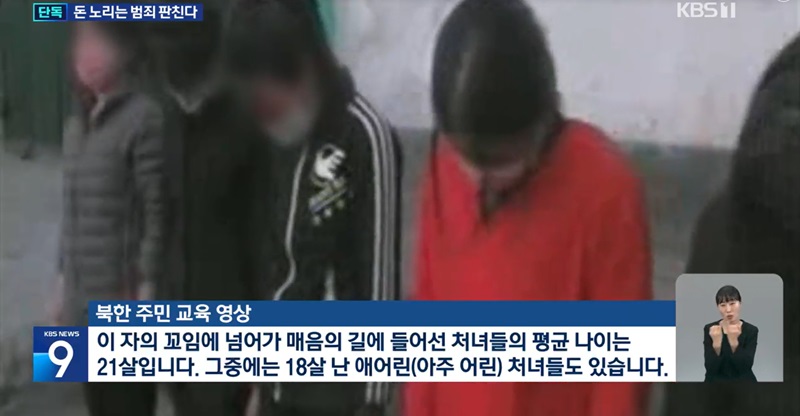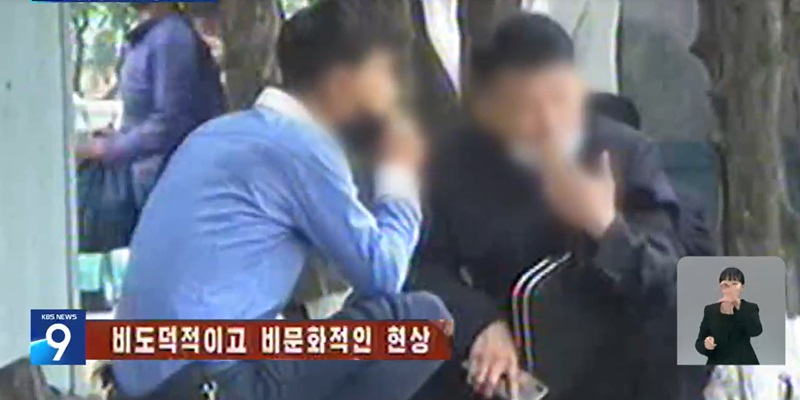Recently released videos exposing the realities of life in North Korea are shedding light on the emergence of new types of crimes despite the regime’s strict social controls. As economic hardships worsen, violent crimes, teenage prostitution, and gang-related violence have been on the rise to make money.
According to a North Korean educational video obtained by KBS, authorities publicly named and shamed a woman who was once a performer in the North Korean version of the circus, accusing her of murdering her parents for money.
“Driven by a small amount of money, she committed such a heinous crime that even animals would be ashamed of killing her own parents,” said Judge Jang Sung-ho at the Pyongyang Court in the video.

Another case highlights a woman who stabbed an acquaintance and stole foreign currency, with her family also being implicated.
“She paid no regard to the fate of her businessman husband and her young son, only seven years old,” a narrator of the video said.
The video also reveals the growing prevalence of financially motivated crimes, reflecting the country’s deteriorating economic situation. One man, caught facilitating prostitution using drugs, lured young women, including teenagers, into the illegal trade.
“The average age of the women he coerced into prostitution was 21,” the narrator noted. “Among them were girls as young as 18.”
Despite the regime’s tight control over its citizens, even organized crime has surfaced, with reports of gangs committing violent assaults and thefts.
The North Korean government reportedly continues its “war on violent crime” for the second consecutive year, but the rise in financially motivated crimes appears difficult to contain as economic woes persist.
Residents and soldiers caught engaging in illegal activities have been captured in an unusual scene where they strongly protested in return.
One video shows inspectors raiding an unauthorized construction material store.
The store was caught using electricity without permission and engaging in illegal expansion.
However, the store manager raised his voice in response, saying, “What treason have I committed? Don’t speak to me so harshly; speak in a way that encourages me to do better.”
Additionally, another video criticizes certain Pyongyang residents for not adhering to public etiquette, especially targeting the younger generation. This highlights the rigid control of the North Korean regime while revealing that such authoritarian measures are becoming less effective.
One clip shows two young men smoking with their masks hanging off their chins during the COVID-19 pandemic, which was condemned by the authorities.
“They spat on the ground, showing shockingly poor manners and an utter lack of cultural refinement,” a narrator of the video said.

North Korea implemented an anti-smoking law in 2020, banning smoking in public places. However, the video notes that younger people are failing to comply with the regulation.
“Most of those who smoke indiscriminately, regardless of time or place, are young men,” the narrator noted.
Another scene criticizes a young man for half-removing his socks in a public setting.
“He should be well aware of how uncomfortable his appearance makes those around him, yet he shows no concern,” the narrator said.
The video goes as far as to accuse him of “forgetting the noble duties of a capital citizen.” This level of excessive scrutiny was unfamiliar even to a defector who fled North Korea just a few years ago.
“It made me think, ‘They’ve resorted to criticizing even how people take off their shoes,’ Jang Mi, a defector from North Korea, said. “We struggled to make ends meet while following strict dress codes, yet I hear in other countries people walk around in their underwear and still live comfortably.”
Experts link this focus on the younger generation’s behavior to the characteristics of the so-called “North Korean Millennial and Generation Z.”
BY YOUNGNAM KIM [kim.youngnam@koreadaily.com]


![Asian Voters’ Support for Trump Rose to 40%, Pew Survey Shows U.S. President Donald Trump delivers an address to the nation accompanied by U.S. Vice President JD Vance, U.S. Secretary of State Marco Rubio and U.S. Defense Secretary Pete Hegseth, at the White House in Washington, D.C., U.S. June 21, 2025. [REUTERS]](https://www.koreadailyus.com/wp-content/uploads/2025/06/0626-Trump-100x70.jpg)

